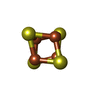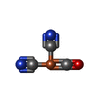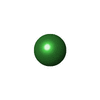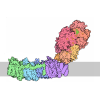[English] 日本語
 Yorodumi
Yorodumi- PDB-9e1j: Alpha-Delta heterodimeric form of soluble hydrogenase I from Pyro... -
+ Open data
Open data
- Basic information
Basic information
| Entry | Database: PDB / ID: 9e1j | ||||||
|---|---|---|---|---|---|---|---|
| Title | Alpha-Delta heterodimeric form of soluble hydrogenase I from Pyrococcus furiosus. Data processed and model refined in P21221 | ||||||
 Components Components | (Sulfhydrogenase 1 subunit ...) x 2 | ||||||
 Keywords Keywords | LYASE / Ni-Fe hydrogenase | ||||||
| Function / homology |  Function and homology information Function and homology informationhydrogen dehydrogenase (NADP+) / hydrogen dehydrogenase (NADP+) activity / [Ni-Fe] hydrogenase complex / ferredoxin hydrogenase activity / 3 iron, 4 sulfur cluster binding / nickel cation binding / 4 iron, 4 sulfur cluster binding / metal ion binding / cytoplasm Similarity search - Function | ||||||
| Biological species |   Pyrococcus furiosus (archaea) Pyrococcus furiosus (archaea) | ||||||
| Method |  X-RAY DIFFRACTION / X-RAY DIFFRACTION /  SYNCHROTRON / SYNCHROTRON /  MOLECULAR REPLACEMENT / Resolution: 2.6 Å MOLECULAR REPLACEMENT / Resolution: 2.6 Å | ||||||
 Authors Authors | Lanzilotta, W.N. / Adams, M.W.W. | ||||||
| Funding support | 1items
| ||||||
 Citation Citation |  Journal: Structure / Year: 2025 Journal: Structure / Year: 2025Title: Structural insights into the biotechnologically relevant reversible NADPH-oxidizing NiFe-hydrogenase from P.furiosus. Authors: Xiansha Xiao / Gerrit J Schut / Xiang Feng / Patrick M McTernan / Dominik K Haja / William N Lanzilotta / Michael W W Adams / Huilin Li /  Abstract: The cytoplasmic hydrogenase I (SHI) from the hyperthermophilic archaeon Pyrococcus furiosus belongs to the group III hydrogenase family. SHI oxidizes NADPH rather than NADH to reduce protons and ...The cytoplasmic hydrogenase I (SHI) from the hyperthermophilic archaeon Pyrococcus furiosus belongs to the group III hydrogenase family. SHI oxidizes NADPH rather than NADH to reduce protons and evolve hydrogen gas, and because of this property, coupled with its high thermal stability, the enzyme holds great potential for economical hydrogen production. Despite decades of efforts, the SHI structure has remained unknown. Here, we report the cryoelectron microscopic (cryo-EM) structures of the heterotetrameric SHI holoenzyme (αδβγ). SHI is a symmetric dimer of two individually functional heterotetramers. SHI-αδ resembles the standard [NiFe] hydrogenase, and SHI-βγ function as the NADPH oxidoreductase. SHI-β contains three [4Fe-4S] clusters that relay electrons from NADPH in SHI-γ to the catalytic [NiFe] cluster in SHI-αδ for H production. These structures will guide the adaptation of this unique enzyme for biotechnological applications. | ||||||
| History |
|
- Structure visualization
Structure visualization
| Structure viewer | Molecule:  Molmil Molmil Jmol/JSmol Jmol/JSmol |
|---|
- Downloads & links
Downloads & links
- Download
Download
| PDBx/mmCIF format |  9e1j.cif.gz 9e1j.cif.gz | 278.9 KB | Display |  PDBx/mmCIF format PDBx/mmCIF format |
|---|---|---|---|---|
| PDB format |  pdb9e1j.ent.gz pdb9e1j.ent.gz | 224.7 KB | Display |  PDB format PDB format |
| PDBx/mmJSON format |  9e1j.json.gz 9e1j.json.gz | Tree view |  PDBx/mmJSON format PDBx/mmJSON format | |
| Others |  Other downloads Other downloads |
-Validation report
| Summary document |  9e1j_validation.pdf.gz 9e1j_validation.pdf.gz | 499 KB | Display |  wwPDB validaton report wwPDB validaton report |
|---|---|---|---|---|
| Full document |  9e1j_full_validation.pdf.gz 9e1j_full_validation.pdf.gz | 571.8 KB | Display | |
| Data in XML |  9e1j_validation.xml.gz 9e1j_validation.xml.gz | 58.8 KB | Display | |
| Data in CIF |  9e1j_validation.cif.gz 9e1j_validation.cif.gz | 76.4 KB | Display | |
| Arichive directory |  https://data.pdbj.org/pub/pdb/validation_reports/e1/9e1j https://data.pdbj.org/pub/pdb/validation_reports/e1/9e1j ftp://data.pdbj.org/pub/pdb/validation_reports/e1/9e1j ftp://data.pdbj.org/pub/pdb/validation_reports/e1/9e1j | HTTPS FTP |
-Related structure data
| Related structure data |  9e15C  9nezC  9nf0C C: citing same article ( |
|---|---|
| Similar structure data | Similarity search - Function & homology  F&H Search F&H Search |
- Links
Links
- Assembly
Assembly
| Deposited unit | 
| ||||||||
|---|---|---|---|---|---|---|---|---|---|
| 1 | 
| ||||||||
| 2 | 
| ||||||||
| Unit cell |
|
- Components
Components
-Sulfhydrogenase 1 subunit ... , 2 types, 4 molecules ACBD
| #1: Protein | Mass: 28650.359 Da / Num. of mol.: 2 Source method: isolated from a genetically manipulated source Source: (gene. exp.)   Pyrococcus furiosus (archaea) / Gene: hydD, PF0893 / Production host: Pyrococcus furiosus (archaea) / Gene: hydD, PF0893 / Production host:   Pyrococcus furiosus (archaea) / References: UniProt: E7FHU4, hydrogen dehydrogenase (NADP+) Pyrococcus furiosus (archaea) / References: UniProt: E7FHU4, hydrogen dehydrogenase (NADP+)#2: Protein | Mass: 47262.457 Da / Num. of mol.: 2 Source method: isolated from a genetically manipulated source Source: (gene. exp.)   Pyrococcus furiosus (archaea) / Gene: hydA, PF0894 / Production host: Pyrococcus furiosus (archaea) / Gene: hydA, PF0894 / Production host:   Pyrococcus furiosus (archaea) / References: UniProt: E7FI44, hydrogen dehydrogenase (NADP+) Pyrococcus furiosus (archaea) / References: UniProt: E7FI44, hydrogen dehydrogenase (NADP+) |
|---|
-Non-polymers , 5 types, 73 molecules 








| #3: Chemical | ChemComp-SF4 / #4: Chemical | ChemComp-FCO / | #5: Chemical | #6: Chemical | ChemComp-CL / | #7: Water | ChemComp-HOH / | |
|---|
-Details
| Has ligand of interest | N |
|---|---|
| Has protein modification | Y |
-Experimental details
-Experiment
| Experiment | Method:  X-RAY DIFFRACTION / Number of used crystals: 1 X-RAY DIFFRACTION / Number of used crystals: 1 |
|---|
- Sample preparation
Sample preparation
| Crystal | Density Matthews: 2.44 Å3/Da / Density % sol: 49.52 % |
|---|---|
| Crystal grow | Temperature: 298 K / Method: batch mode Details: 50 mM potassium phosphate pH 7.5, 150 mM NaCl, and 30% PEG 3350 |
-Data collection
| Diffraction | Mean temperature: 100 K / Serial crystal experiment: N |
|---|---|
| Diffraction source | Source:  SYNCHROTRON / Site: SYNCHROTRON / Site:  APS APS  / Beamline: 22-ID / Wavelength: 1.34 Å / Beamline: 22-ID / Wavelength: 1.34 Å |
| Detector | Type: MAR CCD 300 mm / Detector: CCD / Date: Jan 15, 2018 |
| Radiation | Monochromator: 1.34 / Protocol: SINGLE WAVELENGTH / Monochromatic (M) / Laue (L): M / Scattering type: x-ray |
| Radiation wavelength | Wavelength: 1.34 Å / Relative weight: 1 |
| Reflection | Resolution: 2.6→50 Å / Num. obs: 87815 / % possible obs: 98.9 % / Redundancy: 14.5 % / CC1/2: 0.991 / CC star: 0.998 / Net I/σ(I): 12.2 |
| Reflection shell | Resolution: 2.6→2.69 Å / Num. unique obs: 4457 / CC1/2: 0.555 |
- Processing
Processing
| Software |
| ||||||||||||||||||||||||||||||||||||||||||||||||||||||||||||||||||||||||||||||||||||||||||||||||||||||||||||||||||||||||||||||||||||||||||||||||||||||||||||||||||||||||||||||||||||||||||||||||||||
|---|---|---|---|---|---|---|---|---|---|---|---|---|---|---|---|---|---|---|---|---|---|---|---|---|---|---|---|---|---|---|---|---|---|---|---|---|---|---|---|---|---|---|---|---|---|---|---|---|---|---|---|---|---|---|---|---|---|---|---|---|---|---|---|---|---|---|---|---|---|---|---|---|---|---|---|---|---|---|---|---|---|---|---|---|---|---|---|---|---|---|---|---|---|---|---|---|---|---|---|---|---|---|---|---|---|---|---|---|---|---|---|---|---|---|---|---|---|---|---|---|---|---|---|---|---|---|---|---|---|---|---|---|---|---|---|---|---|---|---|---|---|---|---|---|---|---|---|---|---|---|---|---|---|---|---|---|---|---|---|---|---|---|---|---|---|---|---|---|---|---|---|---|---|---|---|---|---|---|---|---|---|---|---|---|---|---|---|---|---|---|---|---|---|---|---|---|---|
| Refinement | Method to determine structure:  MOLECULAR REPLACEMENT / Resolution: 2.6→35.91 Å / SU ML: 0.37 / Cross valid method: FREE R-VALUE / σ(F): 1.34 / Phase error: 32.61 / Stereochemistry target values: ML MOLECULAR REPLACEMENT / Resolution: 2.6→35.91 Å / SU ML: 0.37 / Cross valid method: FREE R-VALUE / σ(F): 1.34 / Phase error: 32.61 / Stereochemistry target values: ML
| ||||||||||||||||||||||||||||||||||||||||||||||||||||||||||||||||||||||||||||||||||||||||||||||||||||||||||||||||||||||||||||||||||||||||||||||||||||||||||||||||||||||||||||||||||||||||||||||||||||
| Solvent computation | Shrinkage radii: 0.9 Å / VDW probe radii: 1.1 Å / Solvent model: FLAT BULK SOLVENT MODEL | ||||||||||||||||||||||||||||||||||||||||||||||||||||||||||||||||||||||||||||||||||||||||||||||||||||||||||||||||||||||||||||||||||||||||||||||||||||||||||||||||||||||||||||||||||||||||||||||||||||
| Refinement step | Cycle: LAST / Resolution: 2.6→35.91 Å
| ||||||||||||||||||||||||||||||||||||||||||||||||||||||||||||||||||||||||||||||||||||||||||||||||||||||||||||||||||||||||||||||||||||||||||||||||||||||||||||||||||||||||||||||||||||||||||||||||||||
| Refine LS restraints |
| ||||||||||||||||||||||||||||||||||||||||||||||||||||||||||||||||||||||||||||||||||||||||||||||||||||||||||||||||||||||||||||||||||||||||||||||||||||||||||||||||||||||||||||||||||||||||||||||||||||
| LS refinement shell |
|
 Movie
Movie Controller
Controller






 PDBj
PDBj





